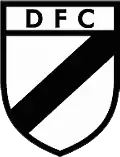Danubio F.C.
Danubio Fútbol Club is a Uruguayan association football club based in Montevideo.
 | ||||
| Full name | Danubio Fútbol Club | |||
|---|---|---|---|---|
| Nickname(s) | La Franja Los de la Curva La Universidad del Fútbol Uruguayo | |||
| Founded | 1 March 1932 | |||
| Ground | Jardines del Hipódromo María Mincheff de Lazaroff, Montevideo, Uruguay | |||
| Capacity | 18,000 | |||
| Chairman | Jorge Lorenzo | |||
| Manager | Leonardo Ramos | |||
| League | Primera División | |||
| 2019 | Primera División, 12th | |||
| Website | Club website | |||
|
| ||||
History
Danubio was founded by the Bulgarian-born brothers Mihail (Miguel) and Ivan (Juan) Lazaroff on 1 March 1932 together with other youths from the "Republica de Nicaragua" school in Montevideo.[1] The club's name is a reference to the Danube river, the second-longest river in Europe. It was proposed by Mihail and Ivan's mother, María Mincheff de Lazaroff. Initially, she suggested the club be named after a different river in Bulgaria – Maritsa. However, the proposal was not approved, as the name was viewed as too feminine.[2][3]
Famous players from the club include Álvaro Recoba, Ruben Sosa, Marcelo Zalayeta, Rubén Olivera, Rubén "Polillita" Da Silva, Javier Chevantón, Fabián Carini, Richard Núñez, Walter Gargano, Carlos Grossmuller, Ignacio María González, Edinson Cavani, Cristhian Stuani, Jose Gimenez, and Camilo Mayada, while Nery Castillo and Diego Forlán played for the youth team before continuing their careers abroad.
Danubio won their fourth Uruguayan league in 2013–14 champions of Uruguay after defeating Montevideo Wanderers on penalties after 120 minutes of football in the third final that finished 2-2 with a last minute bicycle kick equalizer from Camilo Mayada, previously they won their third league in 2006–07 champions of Uruguay after defeating Peñarol 4–1 in December 2006 to claim the Apertura with a very young Edinson Cavani scoring the last goal and then again defeating Peñarol on penalties to claim the 2007 Clausura. Danubio previously won the Uruguayan title in 2004 after defeating Nacional in the last kick of the game with a back heel goal scored by Diego Perrone and in 1988 with a fantastic young squad that included Ruben Polillita Da Silva who scored 30 goals on that season.[4]
Colours and badge
The club decided in 1932 to take Montevideo Wanderers' kit and colours (black and white) as homage to them being the last amateur champion of Uruguay in 1931. Later when entering a zonal league they planned to alter the kit design as Universal Ramírez used the same pattern. The current design was inspired by the red sash over the white kit worn by River Plate, but with the sash in black. This design remains today. The accompanying shorts are typically black (although some seasons they have been white), whilst the accompanying socks are white. In the 2005–06 season, the club wore an unusual green shirt with a white sash as their third kit to play against teams similar in colours (such as Miramar Misiones and Wanderers). In 2007, green was reintroduced in a match against Saprissa of Costa Rica. As of late 2007, it was decided to discontinue use of the green shirt, due to the repetitive defeats against Wanderers and Miramar leading to it being considered a cursed shirt. Red is now used for the third kit. Red and green colors come as alternative colors to the team since Bulgaria's national flag consists of white, green and red.
In late 2019, Danubio introduced a third kit, which pays tribute to the club's Bulgarian roots. The kit's red shirt included white and green horizontal stripes across the chest and sleeves, embodying the Bulgarian tricolour. Further detail, such as a verse of Bulgaria's anthem was also inscribed.[5]
Stadium
Danubio play their home matches at the Jardines del Hipódromo María Mincheff de Lazaroff Stadium. The venue was opened in 1957 and has a capacity of 18,000 people. In 2017, the club's members voted on a new stadium name, the winning option was María Mincheff de Lazaroff, paying tribute to the mother of the founders of Danubio, Mihail 'Miguel' and Ivan 'Juan' Lazaroff. This became the first football stadium in Uruguay to be named after a woman.[6]
Current squad
- As of 22 January 2021
Note: Flags indicate national team as defined under FIFA eligibility rules. Players may hold more than one non-FIFA nationality.
|
|
Other players under contract
Note: Flags indicate national team as defined under FIFA eligibility rules. Players may hold more than one non-FIFA nationality.
|
Youth players in use
Note: Flags indicate national team as defined under FIFA eligibility rules. Players may hold more than one non-FIFA nationality.
|
Out on loan
Note: Flags indicate national team as defined under FIFA eligibility rules. Players may hold more than one non-FIFA nationality.
|
Honours
- 1943
Performance in CONMEBOL competitions
- Copa Libertadores: 7 appearances
- Copa Sudamericana: 6 appearances
- Copa CONMEBOL: 4 appearances
References
- "Danubio's river of talent". FIFA. 23 July 2008. Archived from the original on 2 February 2009. Retrieved 13 January 2009.
- "„Данубио" никога няма да забрави българските си корени". btvnovinite.bg (in Bulgarian). bTV Media Group. 5 December 2019. Retrieved 19 October 2020.
- Shumanov, Metodi (6 December 2019). "Danubio will never forget its Bulgarian roots". tfmethods.com. The Football Methods. Retrieved 19 October 2020.
- Homewood, Brian (18 May 2007). "Soccer-Modest Danubio win Uruguayan championship". Reuters. Retrieved 31 August 2009.
- "Camiseta homenaje a Bulgaria". danubio.org.uy (in Spanish). Danubio Fútbol Club. Retrieved 19 October 2020.
- "Jardines del Hipódromo María Mincheff de Lazaroff". danubio.org.uy (in Spanish). Danubio Fútbol Club. Retrieved 27 October 2020.
External links
| Wikimedia Commons has media related to Danubio Fútbol Club. |
- (in Spanish) Danubio's official website